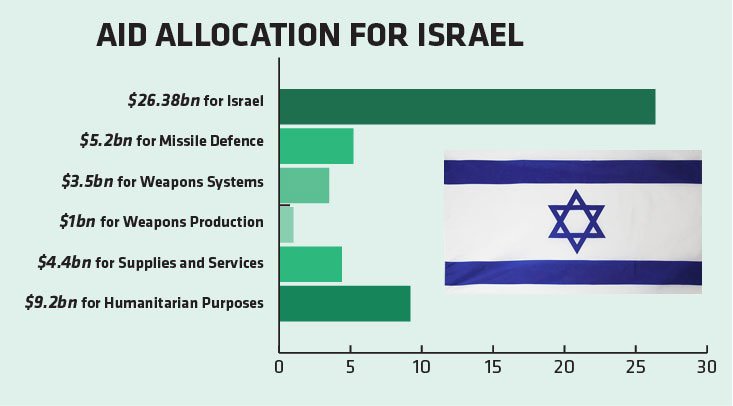The bill, which garnered significant bipartisan support, marks a crucial step in addressing global security concerns
In a landmark decision, the United States House of Representatives has approved a substantial $95 billion legislative package aimed at bolstering security assistance to Ukraine, Israel, and Taiwan. The bill, which garnered significant bipartisan support, marks a crucial step in addressing global security concerns.
You Can Also Read: International reactions after Israel’s reported attack on Iran
With the House’s endorsement, the legislation now awaits approval from the Senate before potentially being signed into law by President Joe Biden in the coming week.
Aid Allocation for Ukraine
The bill provides $60.84bn to address the conflict in Ukraine, specifically:
- $23bn to replenish US weapons, stocks, and facilities;
- $14bn for the Ukraine Security Assistance Initiative, a US Department of State-led funding program that helps train Ukraine’s military and provides equipment and advisory initiatives;
- More than $11bn will fund current US military operations in the region, enhance the capabilities of the Ukrainian military, and boost intelligence collaboration between Kyiv and Washington; and
- $8bn in non-military assistance, including helping Ukraine’s government pay salaries.

On Saturday, 20th April, Ukrainian President Volodymyr Zelenskyy conveyed his appreciation, stating that US lawmakers’ actions were instrumental in maintaining “history on the right track.”
“The vital U.S. aid bill passed today by the House will prevent the escalation of war, safeguard countless lives, and contribute to the strengthening of both our nations,” Zelenskyy expressed on X.
However, in response to the House’s approval, Russian Ministry of Foreign Affairs spokeswoman Maria Zakharova expressed concern, suggesting that the new US aid package could “exacerbate the crisis worldwide.”
Zakharova asserted on Telegram, “Military assistance to the [Ukrainian] regime is tantamount to endorsing terrorist activities.”
Aid Allocation for Israel
The US foreign aid package allocates some $26.38bn for Israel, including $9.1bn for humanitarian needs. Specifically, the allocation will see:
- $5.2bn go to replenishing and expanding Israel’s missile and rocket defence system;
- $3.5bn for buying advanced weapons systems and $1bn to enhance weapons production;
- $4.4bn for other supplies and services to Israel; and
- $9.2bn for humanitarian purposes, including in the Gaza Strip and the occupied West Bank.
However, despite allocating funds for humanitarian assistance, the bill stipulates that funding for the UN agency for Palestinian refugees (UNRWA) is prohibited. This follows Israeli unsubstantiated accusations that the agency’s staff were involved in Hamas’s October 7 attacks.

Israeli Prime Minister Benjamin Netanyahu welcomed the billions of dollars in US assistance, writing on X that it “demonstrates strong bipartisan support for Israel and defends Western civilization”.
But the Palestinian presidency condemned the bill as “an aggression against the Palestinian people” and a “dangerous escalation”. The money would “translate into thousands of Palestinian casualties in the Gaza Strip” and the occupied West Bank, said Nabil Abu Rudeina, spokesman for Palestinian President Mahmoud Abbas.
How Much Will Go to the Asia Pacific?
The legislation allocates $8.12 billion to the Asia Pacific region, with Taiwan being among the recipients. Taiwanese officials have raised concerns about previous delays in the delivery of US weapons, such as Stinger anti-aircraft missiles.
Following the bill’s approval, Taiwan’s Ministry of National Defense expressed gratitude to the US House for its unwavering support, emphasizing the importance of bolstering combat readiness to uphold national security and ensure peace and stability in the Taiwan Strait. The ministry pledged to coordinate budget utilization with the United States through existing channels.
Additionally, the package includes provisions enabling the United States to access frozen assets of the Russian central bank to aid in the reconstruction of Ukraine. It also includes measures for imposing sanctions on Iran, Russia, and China. Furthermore, there are stipulations requiring the Chinese parent company of TikTok to divest its ownership within a year or face a ban in the United States.
Voting Dynamics
The vote on the aid package for Israel yielded a result of 366-58, with 37 Democrats and 21 Republicans in opposition, as reported by Al Jazeera’s Patty Culhane. Culhane noted the vocal criticism from Democrats who opposed the bill, particularly directed at the Israeli prime minister. She emphasized the significance of the dissent, highlighting a notable shift within the Democratic Party.
Representative Ilhan Omar, one of the Democrats who voted against the bill, voiced
This outcome raises questions about future funding for Ukraine if the need arises, as pointed out by Culhane.
Republican Representative Marjorie Taylor Greene, a prominent figure in the far-right flank, opposed assistance to Ukraine and even threatened to oust House Speaker Mike Johnson, calling him a ‘lame duck’. However, Johnson defended the bill as the best possible outcome given the current circumstances. He assumed office last October in response to a deal with Democrats that prevented a partial government shutdown, reflecting the dynamics within the Republican Party.
What’s Next for the Legislation?
The legislative journey now shifts to the slightly Democrat-majority Senate, which had previously passed a similar measure over two months ago. Senate proceedings are slated to commence on Tuesday, with President Biden expressing eagerness to promptly sign the bill into law.
“I urge the Senate to quickly send this package to my desk so that I can sign it into law and we can quickly send weapons and equipment to Ukraine to meet their urgent battlefield needs,” emphasized the president.
Senate Republican Minority Leader Mitch McConnell, bracing to address strong objections from his party’s right flank, underscored the urgency of the task ahead. “The task before us is urgent. It is once again the Senate’s turn to make history,” McConnell asserted.
Chuck Schumer, leader of the Democratic majority in the Senate, affirmed that the vote would indeed commence on Tuesday. “Our allies across the world have been waiting for this moment,” Schumer emphasized.
Impact of These Aid
Despite facing months of delay orchestrated by Republican hardliners under the sway of former President Donald Trump, the bill aimed at securing much-needed funding for Ukraine in its conflict against Russia’s invasion has finally made progress. A bipartisan effort, backed by moderate members of the party, propelled its passage in an exhaustive overnight session in the Democrat-controlled Senate, with 22 Republicans breaking ranks to support the package, resulting in a 70-29 vote.
Nonetheless, the bill’s future remains uncertain as several right-wing Republicans in the House have declared their intention to obstruct it, advocating instead for redirecting the $61 billion earmarked for Ukraine towards domestic priorities such as border security.
The potential repercussions of these measures extend beyond domestic policy, with the possibility of heightened tensions between the US and China, particularly concerning issues involving Taiwan and the South China Sea. The exact consequences hinge on various factors, including China’s response and the broader international political climate. It’s crucial to emphasize that the bill still requires approval from the House before it can be enacted into law.
Conclusion
The bill’s approval by the House underscores bipartisan commitment to addressing global security challenges. However, its fate hinges on Senate deliberations, highlighting the ongoing complexities of international relations and security dynamics.


